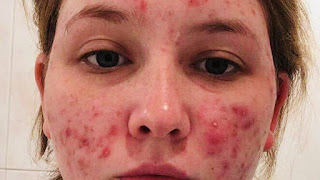7 Proven Tips to Get Rid of Bad Breath and Improve Your Oral Health.
Before we dive into the ways to get rid of bad breath, it's important to understand the causes of halitosis. Many factors can contribute to bad breath, including:
✐Poor oral hygiene: Not brushing and flossing regularly can allow food particles to remain in your mouth, which can promote the growth of bacteria and cause bad breath.
✐Dry mouth: A dry mouth can cause bad breath because saliva helps to wash away food particles and bacteria.
✐Certain foods and drinks: Foods like garlic, onions, and coffee can cause bad breath.
✐Tobacco use: Smoking and other forms of tobacco use can cause bad breath, as well as other health problems.
✐Medical conditions: Certain medical conditions, such as gum disease, respiratory infections, and acid reflux can cause bad breath.
Knowing the cause of the problem is very important, now that we know the cause of bad breath, let's examine some of the effective ways to get rid of breath.
✰ Practice good oral Hygiene:
One of the most effective ways to get rid of bad breath is to practice good oral hygiene. Brush your teeth at least twice a day, ideally after meals, and floss once a day. This will help remove any food particles and plaque from your teeth, which can cause bad breath. You can also use an antiseptic mouthwash to kill any bacteria in your mouth that may be contributing to bad breath.
When brushing your teeth, make sure to brush all surfaces of your teeth, including the fronts, backs, and tops. Use a soft-bristled toothbrush to avoid damaging your gums, and replace your toothbrush every three to four months or sooner if the bristles are frayed. Hygiene is very important, you learn about how to get rid of body odor
✰ Clean your tongue:
Your tongue can harbor bacteria, which can cause bad breath. To clean your tongue, use a tongue scraper or a soft-bristled toothbrush to gently scrape the surface of your tongue. Start at the back of your tongue and work your way forward, rinsing the scraper or brush in between each pass. This will help remove any bacteria that may be contributing to bad breath.
✰Drink a quantity of water
Drinking plenty of water throughout the day can help keep your mouth hydrated and wash away any food particles or bacteria that may be causing bad breath. Aim to drink at least eight glasses of water a day. Drinking water is also essential for good overall health, so it's a win-win.
✰ Chew sugarless gum or suck on sugarless mints:
Chewing sugarless gum or sucking on sugarless mints can help stimulate saliva production, which can help wash away bacteria and food particles that may be contributing to bad breath. Make sure the gum or mints are sugar-free, as sugar can promote the growth of bacteria in your mouth. Xylitol, a sugar substitute commonly found in sugarless gum and mints, has been shown to have antimicrobial properties, making it a great option for combatting bad breath.
✰ Avoid certain Foods:
Certain foods and drinks can cause bad breath, including garlic, onions, and coffee. If you're prone to bad breath, it's best to avoid these foods or limit your intake. If you do eat these foods, make sure to brush your teeth and clean your tongue afterward to help remove any lingering odor.
✰ Visit your Dentist regularly:
Regular dental checkups and cleanings can help identify any dental issues that may be contributing to bad breath, such as gum disease or cavities. Your dentist can also recommend specific products, such as mouthwash or toothpaste, to help combat bad breath. Additionally, if you have any underlying medical conditions that may be causing bad breath, your dentist may refer you to a specialist for further treatment.
✰ Consider your Medications
Certain medications can cause dry mouth, which can lead to bad breath. If you're taking medication and notice that you're experiencing bad breath, talk to your doctor about alternatives or ways to combat dry mouth. You may also want to consider using a mouthwash specifically designed for dry mouth, which can help keep your mouth hydrated and prevent bad breath.
Key facts
The prevalence of oral diseases is a significant health burden that impacts people worldwide, and while these diseases are largely preventable, they can cause considerable pain, discomfort, and even death. According to estimates, oral diseases affect approximately 3.5 billion individuals. Dental caries, also known as tooth decay, is the most common health condition globally, as reported by the Global Burden of Disease 2019. However, despite the availability of preventive measures, oral health treatment can be costly and is often not covered by universal health coverage, creating an access barrier to those in need. This is particularly true for low- and middle-income countries, where there is a shortage of sufficient oral health services. Oral diseases share common modifiable risk factors with noncommunicable diseases, such as high sugar consumption, tobacco use, alcohol use, and poor hygiene, and are influenced by social and commercial determinants.
In conclusion, getting rid of bad breath involves a combination of good oral hygiene, cleaning your tongue, drinking plenty of water, chewing sugarless gum or sucking on sugarless mints, avoiding foods that cause bad breath, visiting your dentist regularly, and considering your medications. By following these tips, you can improve your oral health and say goodbye tbreath.







Comments
Post a Comment